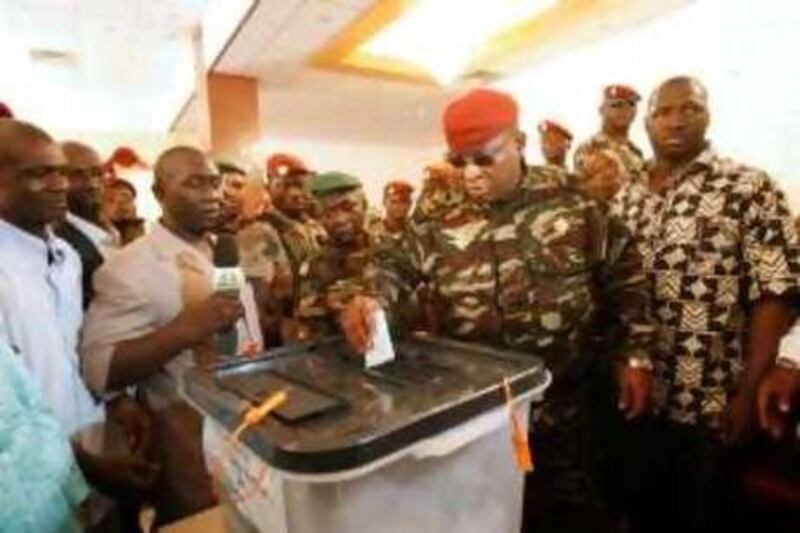BUJUMBURA // Three obscure African states held presidential elections last weekend offering three distinct stories about democracy in Africa. The breakaway Horn of Africa republic of Somaliland went first, voting in long-delayed elections on Saturday. Guinea, a west African bellwether nation, put an end to years of dictatorship and military rule with a poll on Sunday. The tiny central African state of Burundi's election on Monday, meanwhile, was marred by violence, intimidation and a boycott.
The three polls were largely ignored by the international community as being too provincial. But together, the narratives of these elections paint a bigger picture of advancement and retreat of 50-year-old democratic institutions on the continent. The Horn of Africa is not a hotbed of democracy - one party rule in Eritrea; anarchy in Somalia; dictatorship in Ethiopia. But Somaliland has just pulled off its second free and fair election since declaring independence from the rest of Somalia in 1991.
The international community, however, does not recognise the sovereignty of the northern breakaway region. Instead, the rest of the world backs the ineffective government in Mogadishu despite Somaliland's functioning government and two decades of peace. After a two-year delay, voters finally went to the polls in an election that international observers said was peaceful and mostly problem free. "Despite some irregularities, the election process was fair, free and expressed the will of the people," said Conrad Heine, an observer from Britain. "We are looking to a speedy and clear result that is accepted by all the parties."
Votes are still being counted, but the result is not likely to trigger post-election violence that is all too common in Africa. During Somaliland's last presidential election in 2003, Dahir Riyale, the president who is seeking a second term, won by just 80 votes, and the opposition candidate gracefully conceded. Analysts hold up Somaliland as a beacon of democracy in a troubled region. The same could not be said of Guinea until very recently.
One of the most stable west African countries, tucked between former war zones in Sierra Leone, Liberia, Guinea Bissau and Ivory Coast, Guinea was ruled by the military strongman Lansana Conte from 1984 until his death in 2008. Elections were little more than a mandatory show of support for the corrupt dictator. Mr Conte's death was thought to be a chance to finally bring true multiparty democracy to one of the world's largest aluminium ore producers. But instead, a cabal of military leaders seized power and silenced opposition voices, often violently.
Guinea was brought back from the brink when Moussa Camara, the junta leader, was shot and wounded and went into exile in Burkina Faso. Sekouba Konate, an army general, took over and arranged elections barring himself or any military leader from running. Preliminary results are expected this week, and observers praised the poll as being free and fair, a huge turnaround from just a year ago for the resilient Guineans.
Alexander Graf Lambsdorff, the head of the EU observer mission, said: "The Guinean people have taken this opportunity to choose the future of the country by choosing their leader in a free and fair manner, and we will see what happens in the coming days." Guinea is an example for the rest of Africa of how to quickly implement democracy after years of misrule. And then there is Burundi, which is moving in the opposite direction after its election. It was supposed to be the first multiparty election since the end of Burundi's brutal civil war. But all the main opposition parties boycotted the vote after last month's local elections, which they claimed the ruling party rigged.
The final tally is expected this week, but the result is not in doubt. Pierre Nkurunziza, the president, was the only name on the ballot. What will be interesting is the voter turnout that the election commission decides to announce. A high number of voters will validate the election in the eyes of the international community. But at many polling places across Bujumbura, the capital of Burundi, only 20 to 30 per cent of those registered had voted. Still, that will not stop the ruling party from inflating the numbers. They announced an unofficial turnout of more than 90 per cent.
Observers are more concerned with the use of violence and intimidation in the run-up to the election. At least 40 grenade attacks in the weeks before the vote, including 10 on election day, created a climate of fear that kept many people away from the polls. People did not proudly display their ink-stained voting fingers. "One thing we noticed was that there were voters queuing to wash the ink off their fingers," said Francis Cole, an election observer.
"The opposition had said they would cut the fingers off of anyone who voted." Rwanda, Burundi's neighbour to the north, is the next African nation to vote. Political arrests and grenade attacks there are troubling to observers, who hope Rwanda's election next month is more like Guinea's and less like Burundi's. mbrown@thenational.ae





